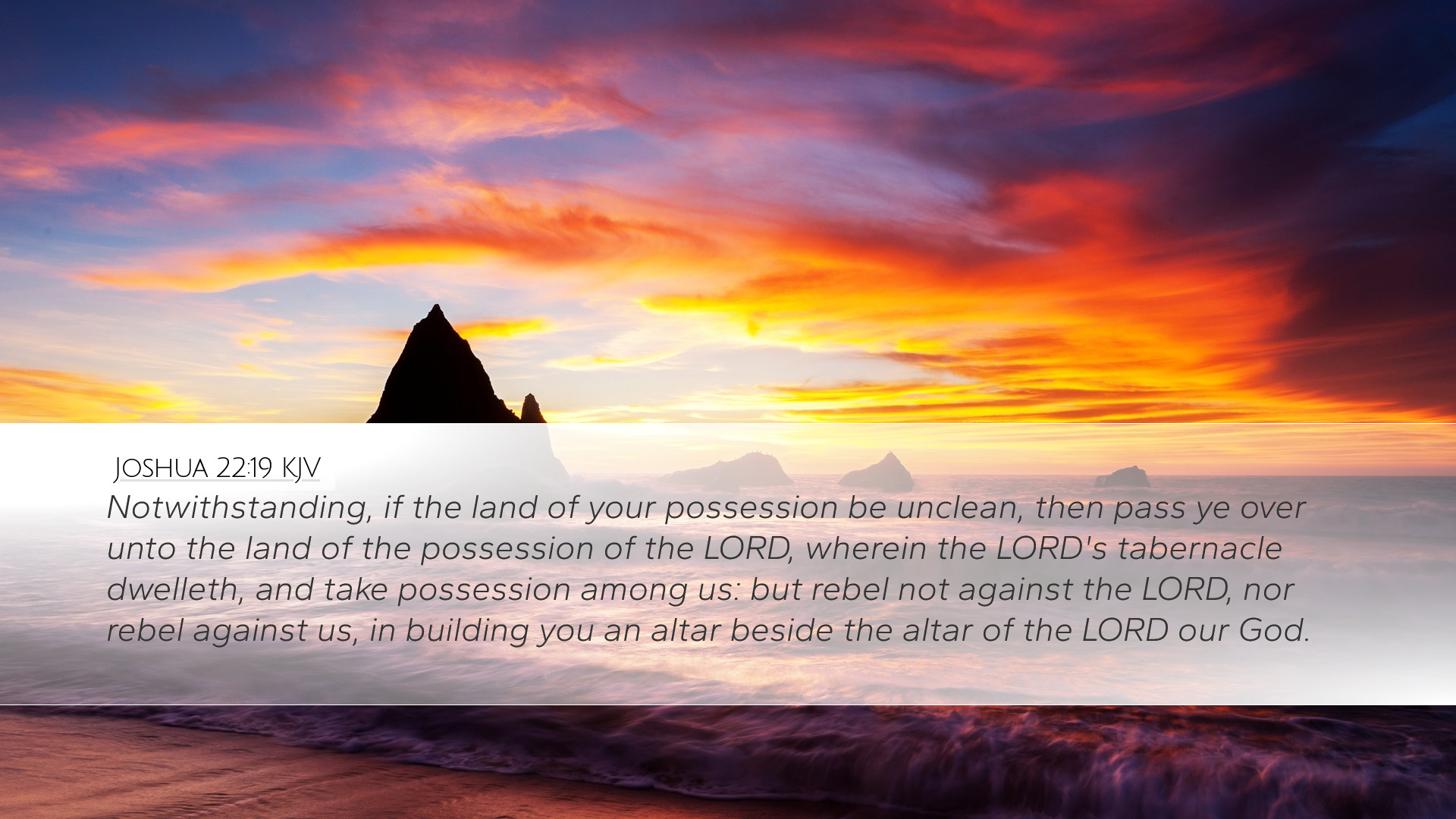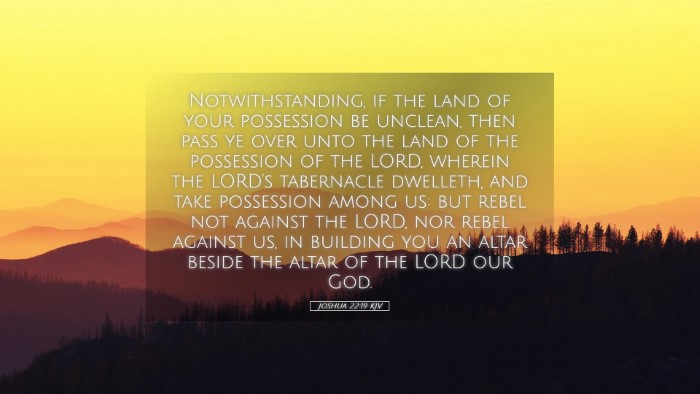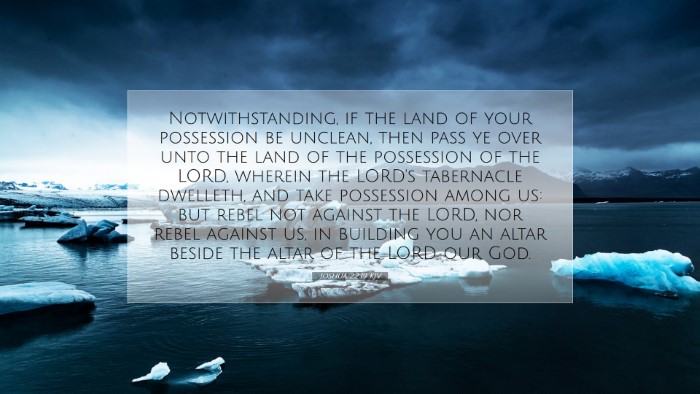Commentary on Joshua 22:19
Verse Reference: Joshua 22:19 - "But if the land of your possession be unclean, then pass ye over unto the land of the possession of the Lord, wherein the Lord's tabernacle dwelleth, and take possession among us: but rebel not against the Lord, nor rebel against us, in building you an altar besides the altar of the Lord our God."
Introduction
This verse occurs in a pivotal moment in the history of Israel during the period of the Judges. It reflects the significant themes of unity, worship, and fidelity to God’s commandments. The Reubenites, Gadites, and the half-tribe of Manasseh had settled east of the Jordan River, and there arose concerns regarding their devotion to Yahweh and their relationship with the other tribes.
Contextual Analysis
To properly understand this verse, it is essential to consider its historical and theological context. The eastern tribes had built an altar, which stirred fears among the Israelites that they were establishing separate worship practices that could lead to idolatry and division in the nation of Israel. The concern exhibited by the western tribes highlights a deep commitment to collective spiritual integrity.
Historical Background
Following the conquest of Canaan, the Israelites were informed by God through Moses regarding the continuation of their covenantal obligations. As they settled in their respective lands, the emphasis on collective worship at the central sanctuary in Shiloh became paramount. In this context, it was crucial for the tribes to avoid any semblance of creating separate religious practices that could lead to fragmentation.
Theological Themes
This verse touches on several theological themes relevant not only to the Israelites but also to the Church today:
- Unity in Worship: The altar built by the eastern tribes, although intended for legitimate reasons, was perceived as a threat to the essential unity of worship ordained by God. This illustrates the importance of a unified approach to worship, as it reflects on the nature of the community of believers.
- Holiness and Cleanness: The reference to the land being "unclean" invokes the necessity of maintaining holiness within the nation. The Israelites understood that sin could contaminate not just personal relationships but can have community-wide implications.
- The Role of Leaders: The leaders of the western tribes took immediate action to address what could have been a crisis. Their approach denotes the responsibility of leaders to safeguard spiritual integrity within the community.
Exegesis from Public Domain Commentaries
Matthew Henry's Commentary
Matthew Henry highlights the concern of the western tribes as a demonstration of their zeal for God's honor. He explains that the building of the altar by the eastern tribes, though not intended for idol worship, raised questions about obedience to God's commands. Henry notes that the response of the western tribes was driven by a genuine desire to maintain purity in their worship, which serves as a lesson for modern-day believers about the vigilance required in spiritual matters.
Albert Barnes' Commentary
Albert Barnes delves deeper into the implications of the term "unclean" associated with the eastern tribes' land. He emphasizes that God's presence was centrally located, and moving away from the tabernacle would jeopardize their spiritual integrity. Barnes illustrates this concern by expounding on Israel's history of straying from God's commands. He argues that the strong warning against building another altar serves as a call to maintain a singular focus on the worship of God as prescribed by Him.
Adam Clarke's Commentary
Adam Clarke provides insights into the social and spiritual ramifications of building altars. He points out that while the eastern tribes’ intentions might have been honorable, a misinterpretation of their actions could lead to significant strife among the tribes of Israel. Clarke emphasizes the idea that worship must remain centralized to uphold the integrity and unity of Israel as a people of God. He stresses the importance of clear communication and understanding among the tribes to avoid unnecessary conflict.
Application for Modern Believers
The principles derived from Joshua 22:19 are timeless. Modern believers can draw several critical applications from this scripture:
- Guarding Unity: Just as the ancient Israelites were concerned about maintaining unity in worship, modern churches must strive for unity among believers. Divisions can arise in subtle ways; thus, wisdom and discernment are essential in maintaining a collective identity in Christ.
- Understanding Holiness: The concept of 'uncleanness' remains relevant today. Believers are called to pursue holiness and keep themselves separate from sin. This maintenance of personal and communal holiness is vital in reflecting the nature of God to the world.
- Leadership in the Church: Leaders must take seriously the responsibility of ensuring that the doctrines and practices of the church align with biblical truths. They must navigate potential conflicts with grace and truth, always focusing on the glory of God.
Conclusion
Joshua 22:19 serves as a reflective mirror for the Church today, calling believers to a commitment to collective worship, holiness, and preservation of unity in Christ. The insights gathered from historical context and exegesis highlight the weight of communal integrity in worshiping the One True God. The experiences of the Israelite tribes demonstrate the necessity of being vigilant and intentional in upholding God’s commands, thus performing a faithful witness to the world.


